Home
| Alexander
Order | Coats-of-Arms
| Articles
| Latest
News
|
Olympia
in review
Anecdotes
from the previous Games
SALT
LAKE CITY....................................February 8-24,
2002
|
776 B.C.E.
..............THE FIRST OLYMPIC GAMES TAKE PLACE
393 C.E.
.................THE LAST OLYMPIC GAMES TAKE
PLACE

The first Olympic
Committee
meets in 1896: Baron de Coubertin is the second from
left.
|
Olympic
Oath
"We
swear to be honorable fighters at the Olympic Games and to
observe the rules.
We
take part: in knightly spirit, to honor our countries and
for the glory of the sport."
|
1896
ATHENS
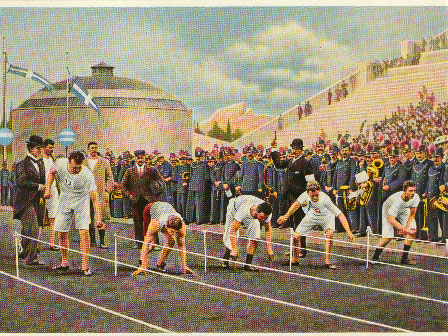
Athens
1896: The
first Olympics of the modern era. The start of the final 100-meter
run. The winner was the American Burke (second from left). His
invention was the deep start, to be used by others in the
future.
- The man most responsible for the
revival of the modern Olympic Games was a French nobleman, Pierre
de Fredi, known as Baron de Coubertin.
- All 295 athletes were
male.
- The first winner of the modern
Olympic Games was an American, Thomas Burke. He won the
100-meter dash in 12.0 seconds.
- 10-year old Dimitrios
Loundras of Greece finished third in the parallel-bars
competition, becoming the youngest athlete to finish in top
three.
- Carl Schuhmann of Germany
was one of the most versatile athletes. He won the super
heavyweight Greco-Roman wrestling and the long horse vault. He
also competed in long jump, triple jump and shot put.
1900
PARIS
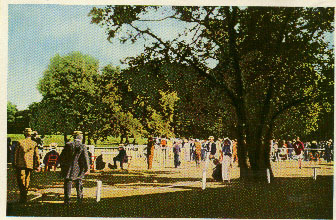
Paris
1900. The
competitions took place at the Racing Club de France in the woods of
Boulogne. The 500-meter track was covered with grass, trees stood in
the way for the viewers.
- Only 11 out of 1,077 competitors
were women.
- Tennis player Charlotte
Cooper of Great Britain was the first woman Olympic
champion.
- The American Alvin
Kraenzlein is the only athlete to win four gold medals in
individual track and field events at a single Olympic Games: in
60-meter dash, 110 and 200-meter hurdles, and the long
jump.
- Count Hermann de Pourtales
of Switzerland was the first member of royalty to become an
Olympic champion. He was a member of the victorious crew in the
one-to-two yachting class.
1904 SAINT
LOUIS
- American archer Robert
Williams won a gold medal in the Double York Round, at the age
of 63 years old.
- Canadian George Lyon won
the golf competiotion. After the awards dinner, Lyon walked on his
hands to accepth his trophy.
1906
ATHENS
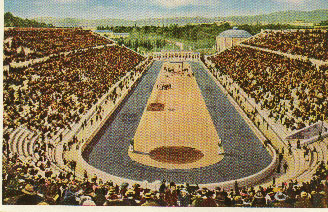
Athens 1906.
A special
Olympic Games took place ten years after the first Olympic Games.The
mangificent Olympic Stadium in Athens, a donation of the Greek
philantropist Averof.
1908
LONDON
- William Dodd won the men's
archery competition, and his sister Charlotte Dodd won the
silver medal in the women's archery competition.
1912
STOCKHOLM
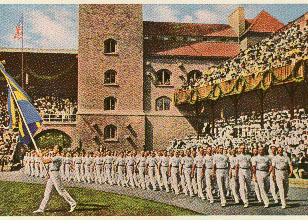
Stockholm
1912. The
entry of the Swedish gymnasts into the stadium of Stockholm, build
from granite and brick. Enchanted, the Royal Family watches the
event.
- The American Jim Thorpe
won the gold medals in both the decathlon and
pentathlon.
- Patrick McDonald, a
350-pound New York City policeman, won gold medal in the shot
put.
1916 not held due to
World War I
1920
ANTWERP
- Gillis Grafström of
Sweden was the only man to win three consecutive Olympic figure
skating gold medals: in 1920, 1924 and 1928.
- Italian Nedo Nade won five
gold medals in fencing events. His brother Aldo Nade also
won three gold medals in fencing.
1924 PARIS (1.
Winter games: Chamonix)
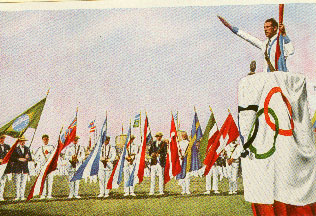
Paris
1924. Geo
Andre, surrounded by flag bearers, swears the Olympic Oath.
- Johnny Weissmüller,
one of the greatest athletes, set 67 world records between 1921
and 1929. At these Olympics, he won three gold medals. Later, MGM
signed him up to star in Tarzan the Ape Man in 1932.
- Paavo Nurmi of Finland won
the gold medal in the 1,500 meter race, and less than ah hour
later, he won the 5,000-meter race.
- Sonja Henie was 11 years
old when she finished last in women's figure skating at these
Olympics. Henie made history by winning the gold medals at the
next three Winter Olympics.
1928 AMSTERDAM (2.
Winter Games: St. Moritz)
- Johnny Weissmüller
wins two more gold medals.
- The Crown Prince Olav of
Norway won gold medal as a member of the six-meter yacht
event. In 1957 he became King of Norway and reigned for 34
years.
1932 LOS ANGELES (3.
Winter Games: Lake Placid)
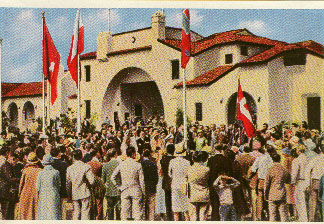
Los Angeles 1932.
The
Olympic Village of Los Angeles has become an example for the future.
For the first time, the men lived here separated from the bustle of
the exciting events.
- The 14-year old Japanese swimmer
Kusuo Kitamura wins the gold medal in the 1,5000-meter
freestyle.
1936 BERLIN (4.
Winter Games: Garmisch-Partenkirchen)
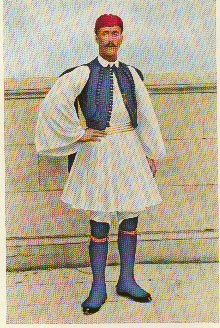
Berlin
1936: The
Greek Louis
Spyridon, the victor of the Marathon race at the First Olympics at
Athens in 1896,
is the last torch bearer in the torch relay from the ancient temple
at Olympia to Berlin. He lights the Olympic vessel at the Olympia
Stadion.
- The American Glenn Morris
wins the decathlon. A brief film career follows.
- Thirteen-year old American
Marjorie Gerstring wins the gold medal in springboard
diving. She is the youngest athlete in summer Olympics to win a
gold medal in an individual event.
- Germany wins the three-day team
equesterian competition thanks to the courage of Konrad von
Wangenheim. He broke his collarbone in a fall during the
endurance run. Despite tremendous pain, the remounted and finished
the course. The following day, his horse reared and fell back on
him. Once again, he ignored the pain and competed the
run.
- The American Cornelius
Johnson wins gold medal in the high jump, with the height of 6
feet, eight inches.
1940 not held due to
World War II
1944 not held due to
World War II
1948 LONDON (winter:
St. Moritz)
- Seventeen-year old American
Bob Mathias wins the decathlon.
- Joe DiPietro, an American
who stood only 4 feet 8 inches, wins the gold medal in the
bantam-weight weightlifting competition.
1952 HELSINKI
(winter: Oslo)
- Bob Mathias wins again
gold medal in the decathlon.
- No runner had ever won the
5,000-meter, 10,000-meter, and the marathon until Emil
Zatopek of Czechoslovakia won all three at these
Olympics.
- The American Parry O'Brien
wins the gold medal in the shot put.
1956 MELBOURNE
(winter: Cortina)
- Parry O'Brien wins again
the gold medal in the shot put.
- The American Milt Campbell
wins the gold medal in the decathlon.
- Al Oerter won the discuss
competition at thes Olympics. The American repeats his feat in
1960, 1964 and 1968.
1960 ROME (winter:
Squaw Valley)
- The Crown Prince Constantin of
Greece wins a gold medal as a member of the dragon class
sailing crew. To celebrate the victory, the future king was pushed
into the water by his mother, Queen Frederika.
- The light heavyweight Cassius
Clay easily wins the gold medal. Clay, whose hand speed
dazzled the spectators, was as quick with a quip. His witty banter
earned him the nickname "The Louisville Lip". Clay was so proud of
his gold medal that he never took it off.
1964 TOKYO (winter:
Innsbruck)
- Despite tearing a cartilage in
his ribs a week before the Games, the American Al Oerter
wins again the gold medal in the discus competition by throwing it
200 feet and one inch.
- Born deaf, Hungarian fencer
Ildiko Ujlaki-Rejtö wins a gold medal in the
individual foil.
1968 MEXICO CITY
(winter: Grenoble)
- The deaf Hungarian fencer
Ildiko Ujlaki-Rejtö again wins a gold medal in the
individual foil.
- Louis Noverraz won a
silver medal as a crew member for Switzerland in the 5.5-meter
sailing competition. He was 66 years old.
1972 MUNICH (winter:
Sapporo)
- 16-year old Ulrike
Meyfarth of West Germany wins the women's high jump. Thus she
becomes the youngest athlete ever to win the gold medal in an
individual track and field event. She also won the gold medal for
the high jump in 1984.
- Francisco Fernandez-Ochoa
wins Spain's first-ever gold medal at a Winter Olympics when
he finished first in the slalom at the Sapporo Games.
1976
MONTREAL
- 14-year old Nadia Comaneci
scored seven perfect tens. The 85-pound Romanian won gold medals
in the uneven bars, balance beam, and all-around
events.
1980 MOSCOW (winter:
Lake Placid)
- United States boycott these
Olympic Games in protest of the invasion of Afghanistan by the
Soviet Union.
- Two days before he was to compete
in the small-bore rifle competition, Karoly Varga of
Hungary broke his shooting hand. Despite the injury, the won the
gold medal.
1984 LOS ANGELES
(winter: Sarajevo)
- Soviet Union boycotts these
Olympic Games in protest against American boycott in
1980.
- Ulrike Meyfarth of West
Germany wins again the gold medal in women's high
jump.
- Mary Lou Retton was a
90-pound American dynamo who electrified the gymnastic world with
her performance. She scored perfect tens in the floor exercise and
vault to win the gold medal in the women's all-around.
- At 6 feet 7 inches, German
Michael Gross was one of the tallest swimmers ever to
compete in the Olympics. With an armspan of more than seven feet,
Gross was nicknamed "The Albatros". He won two gold medals, in the
100-meter butterfly and 200-meter freestyle.
- Carl Lewis, winner of nine
gold medals, was America's greatest athlete. In the long jump,
Lewis soared 28 feet on his first attempt.
1988 SEOUL (winter:
Calgary)
- The American Florence
Griffith-Joyner won three gold medals. The winner of the 100-
and 200-meter dashes, she was almost as famous for her lacy
outfits. She also painted each of her long fingernails a different
color.
- Katarina Witt of Germany
was always the center of attention at any skating event in which
she competed. A dazzling combination of talent and beauty, she won
gold medals in 1984 and 1988.
- Carl Lewis wins gold in
long jump for the second time.
1992 BARCELONA
(winter: Albertsville)
- The gymnast Vitaly Scherbo
of Belarus won a record six gold medals. Four of them came in a
single day when Scherbo won gold medals on four different apparati
on August 2.
- Carl Lewis wins gold in
long jump for the third time.
1996
ATLANTA
- Carl Lewis wins gold in
long jump for the unprecedented fourth time.
2000
SYDNEY
- Super heavyweight Greco-Roman
wrestler Aleksandr Karelin was considered unbeatable. The Russian
had won the previous three gold medals and never lost a match in
13 years of international competition. By contrast, American
Rulon Gardner had never medaled at a world competition.
Gardner beat Karelin 1-0 in the biggest upset of these
Olympics.
Winter Games 2002
SALT LAKE CITY
Keep informed -
join our newsletter:
Copyright 2001 West-Art
PROMETHEUS, Internet Bulletin for
Art, Politics and Science,
Nr. 81, Winter
2001